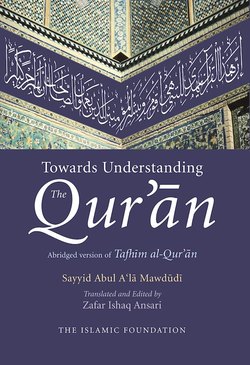Читать книгу Towards Understanding the Qur'an - Sayyid Abul A'la Mawdudi - Страница 38
На сайте Литреса книга снята с продажи.
ОглавлениеIntroduction
When, after the death of the Prophet, the storm of apostasy convulsed Arabia and the Companions had to plunge into bloody battles to suppress it, many Companions who had memorized the Qur’an suffered martyrdom. This led [Umar to plead that the Qur’an ought to be preserved in writing, as well as orally. He therefore impressed the urgency of this upon Abu Bakr. After slight hesitation, the latter agreed and entrusted that task to Zayd ibn Thabit al-Ansari, who had worked as a scribe of the Prophet.6
The procedure decided upon was to try and collect all written pieces of the Qur’an left behind by the Prophet, as well as those in the possession of his Companions.7 When all this had been done, assistance was sought from those who had memorized the Qur’an. No verse was incorporated into the Qur’anic codex unless all three sources were found to be in complete agreement, and every criterion of verification had been satisfied. Thus an authentic version of the Qur’an was prepared. It was kept in the custody of Hafsah (a wife of the Holy Prophet) and people were permitted to make copies of it and also to use it as the standard of comparison when rectifying the mistakes they might have made in writing down the Qur’an.
In different parts of Arabia and among its numerous tribes there existed a diversity of dialects. The Qur’an was revealed in the language spoken by the Quraysh of Makkah. Nevertheless, in the beginning, people of other areas and other tribes were permitted to recite it according to their own dialects and idiom, since this facilitated its recitation without affecting its substantive meaning. In the course of time, in the wake of the conquest of a sizeable part of the world outside of the Arabian peninsula, a large number of non-Arabs entered the fold of Islam. These developments affected
6 For an account of the early history of the Qur’an see Subhi Salih, Mabahith fi [Ulum al-Qur’an (Beirut: 1977), pp. 65 ff. – Ed.
7 There are authentic Traditions to the effect that several Companions had committed the entire Qur’an, or many parts of it, to writing during the lifetime of the Prophet. Especially mentioned in this connection are the following Companions of the Prophet: [Uthman, [Ali, [Abd Allah ibn Mas[ud, [Abd Allah ibn [Amr ibn al-[As, Salim the mawla of Hudhayfah, Mu[adh ibn Jabal, Ubayy b. Ka[b, and Abu Zayd Qays ibn al-Sakan.
xxxvii
